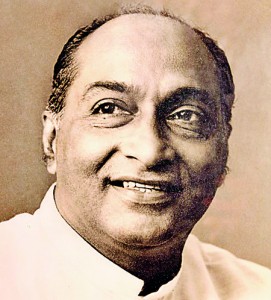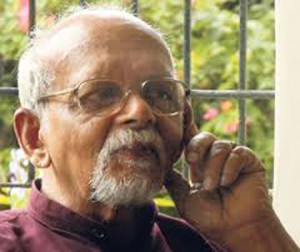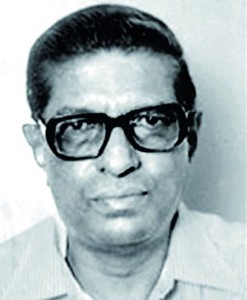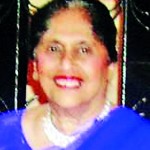Appreciations

Dharmasena Attygalle
I cannot recall a single day when the open verandah of our ancestral home in Madapatha was not full of crowds in the morning. Often keeping my brother and I beside him, he drilled into us, young we may have been, the art of moving with ‘kings and yet not losing the common touch’. His home tucked away amidst herbs and fruit trees galore, was as open as his persona- the doors were open till late in the night and any unexpected guest, welcome at any hour.
My grandfather was of a stock which breeds seldom now. Bidding adieu to his untainted political career ‘prematurely’ as many said, he sought his pleasures among the simple folk of Madapatha. Although largely devoid of the political circuses of today, he found the trials and tribulations of a new political culture unfolding even then, contrary to the integrity and values his school championed.
Winning the Kesbewa electorate with a mandate, still recalled by many as an index of his popularity as a true ‘people’s man,’ he lobbied for the betterment of ‘his people’. His devotion to the common man transcended political parties, race or social standing. He gave a much needed facelift to the Piliyandala town, spearheading scores of social welfare schemes including the improvement of infrastructure and acquisition of lands for schools, hospitals and social welfare causes such as the SOS Children’s Village serving so many even today. His kind of politics was oblivious to chicanery, so much so that like many of his forefathers, aatha gifted generously from his ancestral properties to larger causes of society. Seeing schools, hospitals, libraries and playgrounds built on such property made him a contented man.
A descendant of the illustrious Attygalle clan of physicians, aatha was blessed with the ‘healing touch’. Only a bulath hurulla was exchanged as a token of appreciation. In keeping with the family legacy, he took pains to revive ayurveda in his capacity as the Minister of Indigenous Medicine of the Jayewardene regime. At home, lunuwila, heen bowitiya and thembu kola were part of our everyday life.
His mettle as a man devoted to social betterment was extended to diplomatic service upon his retirement from active politics. Despite the adventurous globe-trotter he was, aatha was rooted to this land. He derived immense pleasure from a simple, rustic way of life. For him any occasion would do for merriment. Replete with wit and an unfailing sense of humour, he could turn any ordinary, mundane hour to a frolicking time. His exceptional hospitality coupled with that extra spice of ‘good humour’ could make anybody feel at home in his jovial company.
A charismatic man with a large heart and a beautiful smile, my grandfather lived a full life in a style of his own. Aatha, your eventful life reminds me of the Great Bard’s words in Julius Caesar: His life was gentle, and the elements so mix’d in him that nature might stand up and say to all the world, This was a man…
Randima Attygalle
(Grand-daughter)
_______________________________________________________________________________
Prof Ashley Halpe
We will always remember him for easing the rutted path
for amateur writers
Professor Ashley Halpe was a member of the English Writers Cooperative for many years, playing an active role in all EWC activities. I remember the times he travelled from Kandy specially to be at our bi-monthly meetings. On several occasions he was a resource person at creative writing seminars I organised when he spoke so eloquently on poetry. Even when his state of health prevented him from attending our meetings regularly, he always responded so positively and so warmly to any writing by the EWC members, promptly acknowledging them and making comments, always encouraging the writer, giving him/her renewed hope of writing better.
 One of his last contributions to EWC activities was his personal commendation of Jean Arasanayagam’s work read at the felicitation evening to Jean organized by the EWC two years ago.
One of his last contributions to EWC activities was his personal commendation of Jean Arasanayagam’s work read at the felicitation evening to Jean organized by the EWC two years ago.
We at the EWC will always remember Ashley as a true and sincere friend, a teacher of the highest calibre who eased the rutted path for amateur writers.
Currently professor of English at Peradeniya, Arjuna Parakrama’s words as a pupil and later as a colleague, represent the collective voices of his pupils who were constantly inspired by this beloved teacher through the years. He writes,
“…..with the passing of Professor Halpe, we have come to the end of an era – an era which those of us were fortunate to be taught by him – will remember with both fondness and gratitude… there are not many academics in the Sri Lankan University system today who can compare with Professor Halpe in terms of his vision, his humaneness and his mastery of the arts, music, literature, theatre and his ability to inspire his students to reach for the best in themselves.”
His prowess in the teaching of English is echoed by those students who passed through his hands at Peradeniya, as expressed by Sumathy Sivamohan, Senior Lecturer in the Department of English at Peradeniya when she says,
‘Professor Halpe was an institution in the English Language Circles…’
His talents were not confined to teaching of English. He was equally versatile in the arts, theatre, music, literature.
His varied achievements in academia, the decision he took to forsake the then prestigious Civil Service for a University career have been lauded over these years. The numerous glittering awards he won, his appointment to the Chair of English at Peradeniya at a relatively young age, becoming the youngest to ever hold this prestigious and much prized Chair, the many awards, citations and titles he won continuously, always sat lightly on him.
“Above all, he was a University don in the finest sense of that term, a teacher, researcher, disseminator of knowledge… his contribution to the University of Peradeniya has been significant and substantial… above all, he was a very true, near perfect gentleman…” says Tissa Jayatilleke in the eulogy he wrote on Professor Halpe’s passing away early this year.
We at EWC will remember him for all these qualities and more for the friendship he gave us so cheerfully and often at the cost of his health.
Jean Arasanayagam, a contemporary and good friend at Peradeniya, remembers him thus, in her poem… ‘Requiem for Ashley Halpe and the Lost Generation of Our Youth.’
Here is an extract –
Agnus Dei
‘Requiem for Ashley Halpe and the Lost Generation of Our Youth’
Our voices rose in harmonious unison, as we
Sang in chorus of men and angels.
We had yet to create our own words, our
Own cadences to the music that throbbed within
Our hearts, our brains, words that gushed a thousand fold with time and the swift
Passing of the years recapturing echoes from
That long ago past that faintly soared before
Both words and melody are lost.
Vijita Fernando
This first appeared in Channels – Journal of the English Writers Cooperative Sri Lanka,
Volume 22 – 2016
__________________________________________________________________________________
Harold Pieris
He saw it all: Lake House with its journalistic virtues
and political blemishes
Harold Pieris was as solid as the pillars of Lake House. Although big-made and bulky, Harry’s strength was that of a gentle giant. His presence was a comforting one, for, although he worked behind the scenes, the skill he displayed in every field of journalism and newspaper administration made him as durable as the elegant pillars on which D.R. Wijewardene constructed his edifice.
When Harry joined Lake House, the old patriarch was gone but something of his benign avatar must have touched the future Chief Administrative Officer of the Editorial Department. For, although he started off as a journalist on the ‘Daily News’, Harry was for long years the chief executive of the editorial department ruling over a vast sub-kingdom of the Lake House empire. He was a close associate and confidant of Esmond Wickremesinghe, that political wizard and eminence grise of the establishment who established Lake House as the powerful tool of UNP propaganda.

Harold Pieris
An oldJosephian, Harry joined the ‘Daily News’ as a sub-editor after graduating from the University of Ceylon. He also served the ‘Daily News’ as its News Editor but when I got to know him in themid seventies as a cub reporter, he was the Chief Administrative Officer or CAO occupying the room next to the Chairman. In his long-sleeved shirts and baggy trousers, Harry was the embodiment of propriety. In him was the wisdom of the ages and he was the repository of ancient knowledge and newspaperfolk lore.
He was the first Lake House man I met when I joined in May 1975. After handing me my letter of appointment, he dispatched me with a peon to meet the Editor of the ‘Observer’ W. Lionel Fernando who in turn handed me over to his Deputy Editor Philip Fernando (now domiciled in California) and the News Editor, the late Carlton Seneviratne.
Our paths crossed again when after the General Election of 1977 which was preceded by a strike at Lake House he was appointed as the Editor of the ‘Observer’. He occupied that chair for 12 years and edited the paper during the entire J.R. Jayewardene Presidency.
This was no small achievement, for, on the other side of the editorial corridor, successive Editors of the ‘Daily News’ were finding that the coveted editorial chair of the Lake House flagship was becoming warmer and warmer to sit on. If Harry chose to write his memoirs that would have been quite revealing for as the closest Lake House associate of Esmond Wickremesinghe he was privy to all the manoeuvrings and Byzantine intrigues which were associated with Lake House in its capacity as a political king-maker, always an inflated notion but an illusion which the old Lake House loved to cling to. One of the most interesting periods in this respect was the mid-sixties when Esmond Wickremesinghe began a Sinhala newspaper ‘Udaya’ printed on the presses of Express Newspapers, the publishers of the ‘Virakesari.’
The principal share-holders were Wickremesinghe himself, Dudley Senanayake and J.R. Jayewardene, the Prime Minister and Minister of State respectively at the time.
Harry was the handpicked Managing Director of the company which also produced a science newspaper in Sinhala. ‘Udaya’ was an intriguing project which brought a refreshing new whiff to the respectable mainstream Sinhala journalism of the day. The idea was to launch an anti-establishment newspaper suitably critical of the UNP Government of the day for it was perceived that the mainstream press was uniformly respectful towards and supportive of the Government. It was characteristic of Wickremesinghe that he should have started such a venture with the two most powerful men in the country at the time as principal shareholders.
‘Udaya’ was something of an enfant terrible of the times. Edited by Philip Fernando, it had some of the most colourful former Lake House writers such as Tissa Gunatilleke and the first Editor of the ‘Aththa’ Richard Wijesiri on its staff. Chintana Jayasena, that lovable imp who later went on to edit his own paper ‘Columa’, the Sri Lankan version of ‘Private Eye’ cut his teeth there.
Although his life was full of rich political experiences, Harry rarely spoke of them. He was a conservative, very proper man, a devout Catholic and a staunch Rotarian who organized every year the Interschool Shakespearean Drama Festival for Rotary. In fact, his last appearance in print was to pay a memorial tribute to old Lake House colleague Bonnie Fernando who was for many years one of its judges.
It was difficult to penetrate Harry’s imperturbable mask but I feel that behind it was a man who felt deeply, although he never articulated his feelings. Certainly, he had a ringside view of political intrigue and skullduggery but he was never a cynical participant in them. If at all, he saw it as his duty to play his part.
Harry’s finest hour was in 1978 when he figured in the now-famous breach of privilege case when he and Associate Editor Philip Coorey became the only journalists to be brought to the Bar of Parliament and tried by Parliament sitting as a court for the first time.
This is how the ‘Observer’ in its editorial of May 29 (the day of his burial) described the episode headlined: Harold Pieris in Parliament.
‘Harold Pieris, the former Editor of this newspaper whose burial will take place at the General Cemetery, Kanatte this afternoon, had already reserved for himself a niche in the political history of Sri Lanka albeit by accident. As the Editor of the Observer in 1978, he along with Associate Editor Philip Coorey became the only journalists to be tried for a breach of privilege of Parliament by the entire House sitting as a court.
‘The manner of his trial was a manifestation of the bizarre manoeuvring of the parliamentary system by the UNP Government of President J.R. Jayewardene which contributed no little towards undermining the people’s faith in the democratic political system. The fact that this trial took place on the eve of Mr. Jayewardene assuming office as Executive President was no accident. It was a signal to the entire mass media that the Government intended to be tough with it.
‘As it was there was hardly any need for such macho exhibitionism. The press was fulsome in its support of the newly-installed Jayewardene Government. There were no voices of dissent except for the Aththa edited with his usual panache by that maestro of Sinhala journalism, the late B.A. Siriwardene. Yet the Government felt it necessary to beef up the Parliamentary Powers and Privileges Act and the fact that its first victim was an Editor of the government owned Lake House was typical of the cruel cynicism of the regime.
‘No piece of theatricals could have been more crudely contrived to advertise the muscle power of the regime. The day after the new Act was passed the Minister of Foreign Affairs A.C.S. Hameed got up in Parliament to complain the Observer had been guilty of a breach of privilege. The Minister said that the paper had carried a photograph of Jane Fonda and a companion on board a pleasure cruiser with the caption that Mr. Hameed was inspecting an industrial complex in South Korea. The correct photograph had appeared on the same page saying that it was Jane Fonda.
‘Mr. Hameed’s contention was that since he had to travel a great deal as the Foreign Minister this mix-up of captions constituted a breach of his parliamentary privileges presumably because the less knowledgeable citizens of the world might associate the Minister with Ms. Fonda.
‘Pieris and Coorey were summoned before the Bar of the House the same afternoon. Lake House had instructed them to plead guilty although Pieris was not on duty that day and as Acting Editor Coorey had taken immediate steps to withdraw the papers once the mistake was detected (although some had gone into the streets before) and correct the mistakes in the next edition. An apology had been carried the next day.
What followed was an unprecedented spectacle in the history of Sri Lanka’s Parliament. Member after member of the UNP parliamentary group got up to cross-examine Pieris and Coorey who were like the hapless Roman men thrown to the lions. It was finally left to the Leader of the Opposition A. Amirthalingam to interject in exasperation, “Let us put a stop to this. We are like little children trying on new clothes.”
What impressed the observers of Parliament that day was the quiet dignity and absolute unruffled calm with which Harold Pieris faced his tormentors. Dressed in a white suit he sat calmly at the bar of the House answering all questions quietly.
By the dignity of his demeanor and the sobriety that was always the hallmark of the man he exposed the charade into which he had been dragged accidentally but with diabolical intent.
Although the most peaceful of men, his fighting qualities asserted themselves again in 1989 when he found the climate at Lake House more and more stifling.
True, Lake House had been administered as a Government-controlled newspaper from 1973 but by now the heavy hand of crude political interference and gross intervention was becoming unbearable. That was when Harry resigned with dignity.
Harold Pieris perhaps was the last gentleman in journalism. But, being a gentleman carries its own perils and pitfalls. He was sometimes over cautious, too much of a conservative. But he had his heart in the correct place.
He did not think it worthwhile to hit his head against a brick wall but he always lived by his own lights. Highly duty-conscious his death brings to an irrevocable end and brings down the curtain on the old Wijewardene-Wickremesinghe Lake House with all its journalistic virtues and political blemishes.
Ajith Samaranayake
(This tribute first published in The Sunday Observer of June 01, 1997, is being reproduced to mark Harold Pieris’ 20th death anniversary which falls today. The writer, a leading editor at Lake House
passed away in 2006)
____________________________________________________________________________________
Rukie Eheliyagoda
A mother greatly loved and cherished
I send this bouquet of words of love
To her heavenly abode above
Reached the milestone three score and thirty
Embraced life’s hues gallantly and cheerfully.

A mother so gracious, never to find
So understanding, compassionate and kind
When troubled, always found her by my side
Never to leave until my tears were dried.
The fabric of the family closely woven
Held firmly by a thread rare and golden
Teaching integrity, loyalty and generosity
Above all to love and fear God in humility.
A smile ever present; voice like a nightingale
A heart that quickly melted with each sad tale
Envy, hatred, vengeance found no place to dwell
In her soul, never to be claimed by hell.
“Anything worth doing is worth doing well and fast”
Her motto for life through the years past
Caressed by her love my days so happy and calm
An endless labour of love by a marvellous Mum.
God picked me out from the rest
And gifted me a mother -
Better than the best
Charmaine Madurasinghe


